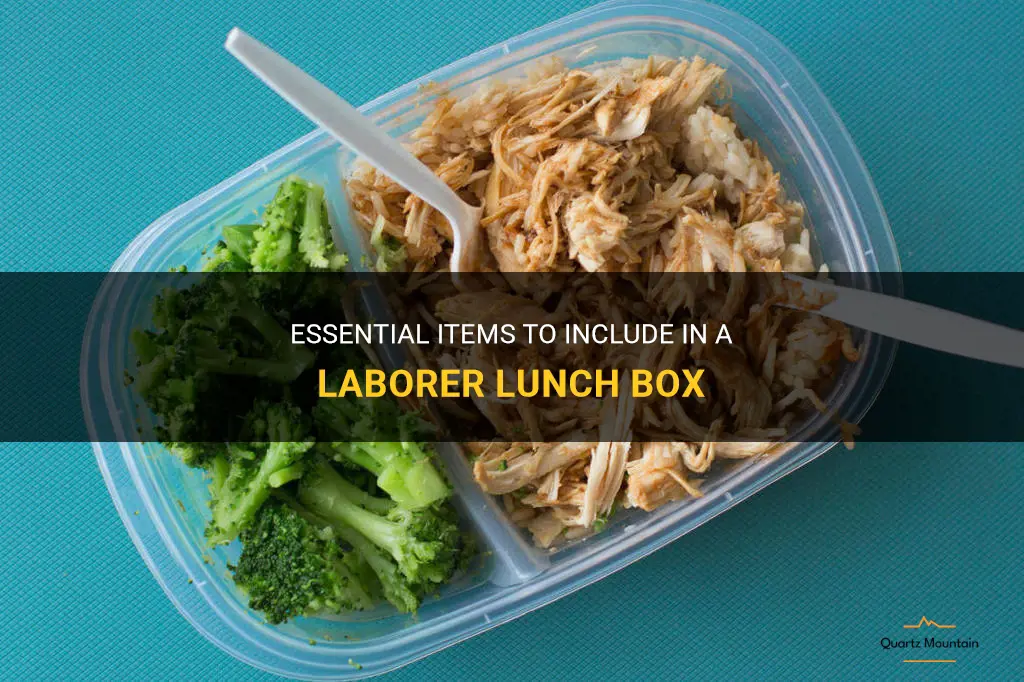
Are you a laborer looking to pack a lunch that will keep you energized and satisfied throughout the day? Look no further! In this article, we will explore the essential items to include in a laborer lunch box that will provide you with the fuel you need to conquer any task. From protein-packed snacks to hydrating beverages, we've got you covered. Say goodbye to midday slumps and hello to productivity!
What You'll Learn
- What are some healthy and nutritious foods to pack in a laborer's lunch box?
- How can I ensure that the food in a laborer's lunch box stays fresh and safe to eat throughout the day?
- Are there any specific dietary restrictions or considerations I should take into account when packing a laborer's lunch box?
- What are some good portable snacks and quick meals that are suitable for a laborer's lunch box?
- Are there any tips or tricks for packing a laborer's lunch box in a way that is efficient and easy to transport?

What are some healthy and nutritious foods to pack in a laborer's lunch box?
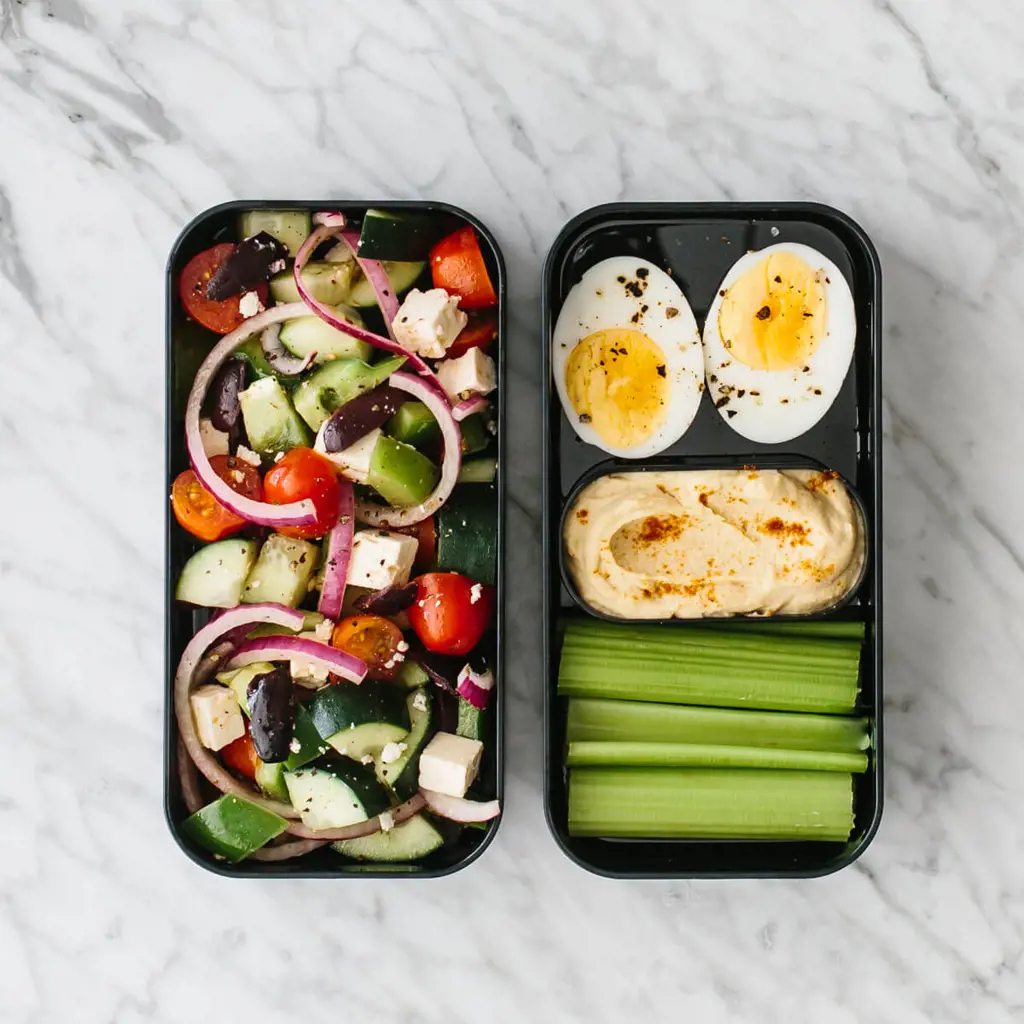
Laborers often have physically demanding jobs, which require them to consume a diet that is both healthy and nutritious. Packing a lunch box with the right foods can provide them with the energy and nutrients they need to get through their workday. Here are some healthy and nutritious foods that are perfect for a laborer's lunch box.
Lean Proteins:
Including lean proteins in a laborer's lunch box is essential, as it helps in muscle repair and growth. Good sources of lean proteins include chicken breast, turkey breast, fish, and tofu. These proteins also aid in promoting satiety, preventing the urge to snack on unhealthy foods throughout the day.
Whole Grains:
Whole grains are an excellent source of carbohydrates, which provide the necessary energy required for a physically-demanding job. Opt for whole grain bread, brown rice, quinoa, and whole wheat pasta. These complex carbohydrates release energy slowly, keeping laborers feeling fuller for longer.
Fruits and Vegetables:
Including a variety of fruits and vegetables in a laborer's lunch box helps provide essential vitamins, minerals, and fiber. Fruits like apples, bananas, and oranges are easy to pack and provide a quick energy boost. Vegetables such as carrots, celery, and bell peppers can be sliced and packed for a healthy snack. Additionally, adding leafy greens like spinach or kale to sandwiches or wraps can increase nutrient intake.
Healthy Fats:
Laborers need healthy fats to help maintain energy levels and support overall health. Nuts and seeds, such as almonds, walnuts, and chia seeds, are great options for adding healthy fats to a lunch box. Avocado is another excellent source of healthy fats and can be sliced or mashed and used as a spread for sandwiches.
Hydration:
Staying hydrated is crucial for laborers, especially in hot and physically demanding environments. Water is the best choice for hydration, but laborers can also pack flavored water, herbal tea, or coconut water. Avoid sugary drinks or energy drinks, as they can lead to energy crashes and dehydration.
Snacks:
Including healthy snacks in a laborer's lunch box can help provide additional sustenance throughout the day. Some great snack options include yogurt, hummus with whole grain crackers, trail mix, and homemade energy bars or protein balls made with nuts, seeds, and dried fruit.
In conclusion, packing a laborer's lunch box with a combination of lean proteins, whole grains, fruits, vegetables, healthy fats, and hydration is essential for providing the necessary nutrients and energy required for a physically demanding job. By incorporating these foods, laborers can stay fueled and focused throughout the workday while promoting overall health and wellbeing.
Essential Items to Pack for Natural Disasters: Tips for Being Prepared
You may want to see also

How can I ensure that the food in a laborer's lunch box stays fresh and safe to eat throughout the day?
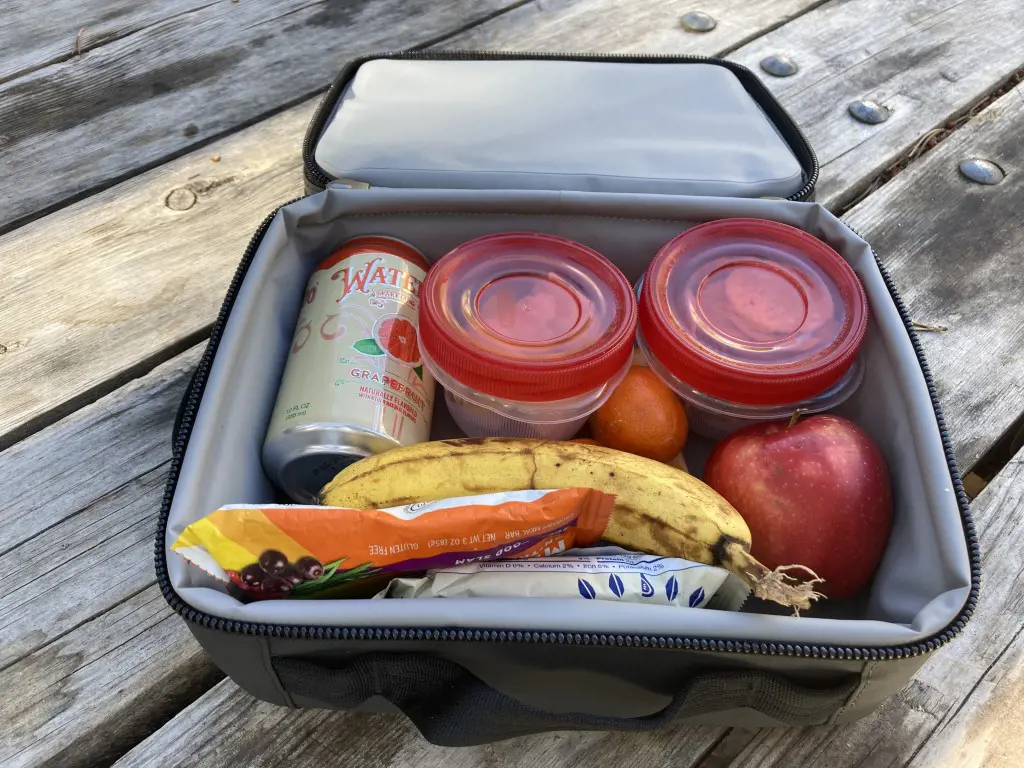
Being a laborer can be physically demanding work, and it is crucial for workers to be properly fueled and nourished throughout the day. One way to ensure this is by packing a lunch box with fresh and safe to eat food. Here are some tips on how to keep the food in a laborer's lunch box fresh and safe to eat throughout the day.
- Use an insulated lunch box: An insulated lunch box helps to maintain the temperature of the food, keeping it cool or warm depending on which is necessary. This can help prevent the growth of bacteria that can make the food spoil.
- Keep perishable foods refrigerated or use a cold pack: If the laborer will be away from a refrigerator for an extended period, it is important to keep perishable foods like meat, dairy products, and salads refrigerated. Packing them in a cooler bag with ice packs can help maintain their freshness and prevent spoilage.
- Choose foods that are resistant to spoiling: Some foods are more resistant to spoiling than others. For example, sandwiches made with whole wheat bread, lean protein sources like chicken or turkey, and vegetables like lettuce and tomatoes can hold up well throughout the day without refrigeration. Avoid mayonnaise-based dressings or spreads, as they can spoil quickly.
- Pack foods in separate containers: To prevent cross-contamination and maintain food quality, it is essential to pack different types of food in separate containers. This prevents the juices from raw meat or vegetables from coming into contact with other foods, reducing the risk of foodborne illness.
- Use proper food storage and handling techniques: It is important to follow good food safety practices while preparing and packing the lunch. Wash hands thoroughly with soap and water before handling any food. Clean all utensils, cutting boards, and surfaces properly. Make sure to store the lunch box in a clean and dry place when not in use.
- Take precautions against exposure to heat: If the laborer works in a hot environment, it is crucial to take extra precautions to ensure food safety. Avoid leaving the lunch box in direct sunlight or in a hot car. Instead, store it in a shaded and cool area as much as possible. Consider adding a frozen water bottle or extra ice pack to keep the lunch box cool throughout the day.
Examples:
- Sarah is a construction worker, and she follows these steps to ensure that her lunch stays fresh and safe throughout the day. She uses an insulated lunch box, packs perishable foods in a cooler bag with ice packs, and separates different foods into different containers. She also makes sure to wash her hands before packing the lunch and keeps the lunch box in a shaded and cool area. As a result, her lunch is always fresh and safe to eat even after several hours of work.
- John is a laborer who works in a hot outdoor environment. He makes sure to take extra precautions to keep his lunch fresh and safe. He uses an insulated lunch box and adds a frozen water bottle to keep the temperature low. He also packs foods that are resistant to spoiling, such as whole wheat sandwiches with lean protein sources and vegetables. By following these steps, John can enjoy a fresh and safe lunch even in the heat.
In conclusion, packing a lunch box with fresh and safe to eat food is essential for laborers who need proper fuel and nourishment throughout the day. By following these steps and taking necessary precautions, laborers can ensure that their food stays fresh and safe to eat, promoting their overall well-being and productivity.
Essential Items to Pack for a Liveaboard Adventure
You may want to see also

Are there any specific dietary restrictions or considerations I should take into account when packing a laborer's lunch box?
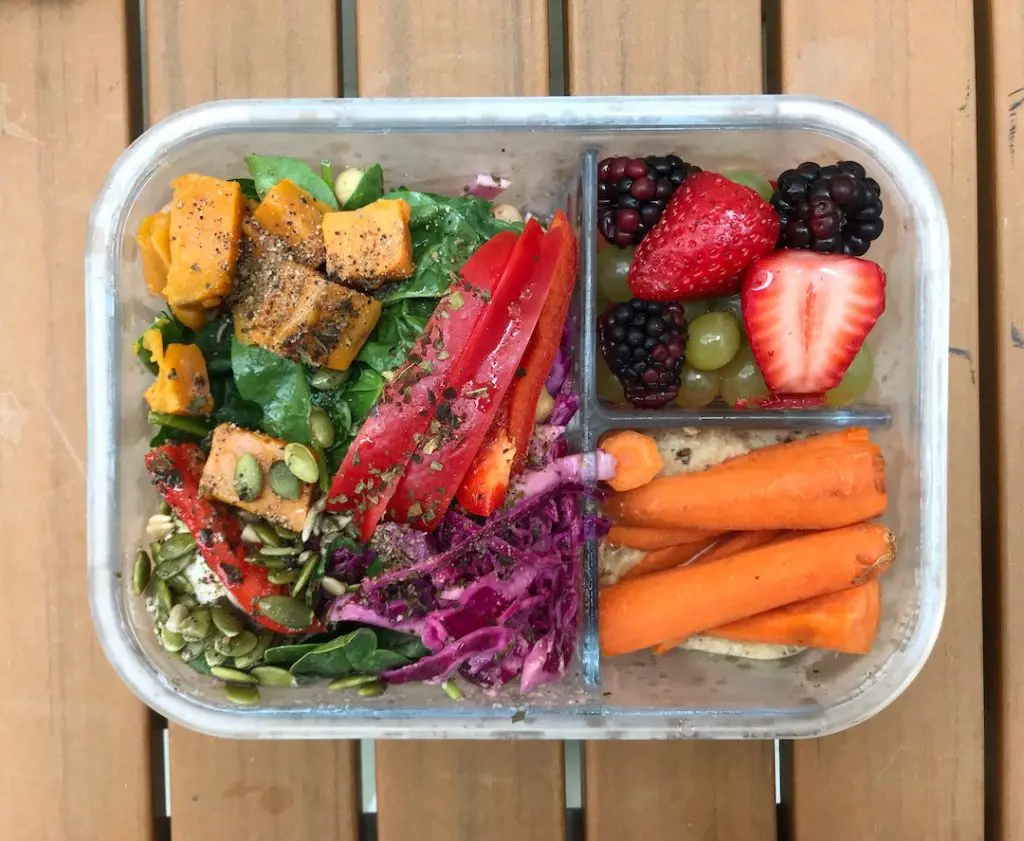
When it comes to packing a lunch box for laborers, there are certain dietary restrictions and considerations that you should take into account in order to ensure that they receive the necessary nutrients and energy to sustain their physical exertion throughout the day. Here are some key factors to consider:
- Caloric requirements: Laborers typically have higher caloric requirements due to the physical demands of their work. It is important to pack a lunch that is calorically dense to provide them with the energy they need. Include foods that are high in carbohydrates, such as whole grains, fruits, and vegetables, as these provide a steady source of energy.
- Protein intake: Protein is essential for muscle repair and growth, which is particularly important for laborers. Include adequate amounts of protein in the lunch box by including lean meats, poultry, fish, eggs, dairy products, legumes, or plant-based protein sources like tofu or tempeh.
- Hydration: Laborers often work in hot and physically demanding environments, so it is crucial to keep them hydrated. Pack a water bottle and encourage them to drink water regularly throughout the day. Consider adding electrolyte-rich beverages or sports drinks to replenish the minerals lost through sweating.
- Nutrient-dense options: Laborers need to consume a variety of vitamins and minerals to support their overall health. Include nutrient-dense options like colorful fruits and vegetables, which provide essential vitamins and minerals. Consider packing a salad with a variety of vegetables, a piece of fruit, and some nuts or seeds for added crunch and nutritional value.
- Avoid processed foods: Processed foods, such as fast food or packaged snacks, tend to be high in unhealthy fats, sodium, and added sugars. These types of foods can contribute to inflammation, fatigue, and weight gain. Instead, focus on whole foods that are minimally processed. Opt for whole grains, lean proteins, and fresh produce.
- Timing of meals: Laborers often have physically demanding work schedules and may not have regular breaks to eat. Consider packing a lunch that can be easily consumed on the go, such as sandwiches, wraps, or pre-portioned meals. Additionally, it is ideal to provide smaller, more frequent meals to maintain energy levels throughout the day. Include snacks like nuts, yogurt, or granola bars for quick and easy access to fuel.
Overall, packing a lunch for laborers requires careful consideration of their unique nutritional needs. By including a balance of macronutrients, adequate hydration, nutrient-dense options, and avoiding processed foods, you can ensure that they are getting the necessary fuel to perform their physically demanding job effectively and maintain their overall health.
Essential Items to Pack for Orientation at College or University
You may want to see also

What are some good portable snacks and quick meals that are suitable for a laborer's lunch box?
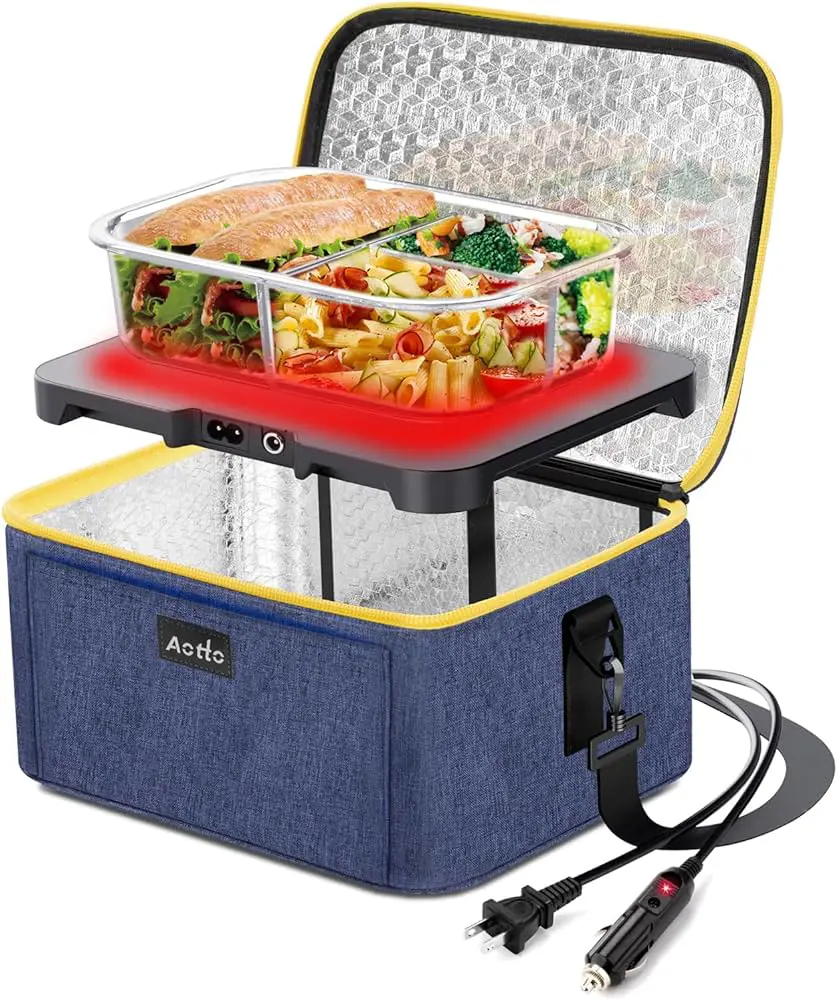
Laborers require nourishing and energy-dense meals to fuel their physically demanding work. When it comes to choosing snacks and quick meals for a laborer's lunch box, portability and convenience are key factors. Here are some excellent options that provide the necessary sustenance for a laborer's lunch in a quick and easy format.
Sandwiches and Wraps:
Sandwiches and wraps are portable, versatile, and can be made with a variety of fillings. Opt for whole-grain bread or wraps to increase the nutritional value. Consider filling options such as lean meats (turkey, chicken, roast beef), cheese, hummus, tuna, and vegetables like lettuce, tomatoes, and cucumbers. These options provide a good mix of carbohydrates, protein, and fiber.
Fruit and Nut Mix:
A blend of dried fruits and nuts is a great option for a portable snack. Dried fruits like raisins, apricots, and cranberries provide natural sugars for quick energy. Nuts like almonds, walnuts, and cashews offer healthy fats and protein, which help in sustaining energy levels throughout the day. Pack them in a small container or resealable bag for easy access.
Yogurt and Granola:
Greek yogurt is an excellent source of protein and can be easily packed in a lunch box. Pair it with a side of granola for additional fiber and crunch. Choose granolas with low added sugars and whole grains for a healthier option. This combination provides a satisfying and nutritious snack that can keep a laborer fueled during the work hours.
Hard-boiled Eggs:
Hard-boiled eggs are a wholesome and portable snack option for laborers. They are packed with protein, healthy fats, vitamins, and minerals. For added flavor, sprinkle some salt, pepper, or paprika. Hard-boiled eggs can be made in advance and stored in the fridge for convenience.
Energy Bars:
Pre-packaged energy bars can be a great option for a quick and convenient snack. Look for bars that are low in added sugars and high in protein and fiber. These bars often contain a mix of nuts, seeds, dried fruits, and grains, which provide a good balance of macronutrients for sustained energy.
Vegetable Sticks and Hummus:
Cut up a mix of vegetables, like carrot sticks, celery, and bell peppers, and pair them with a side of hummus. Hummus is packed with protein and fiber, while the vegetables provide essential vitamins and minerals. This snack is refreshing, light, and offers a good balance of nutrients.
Whole Grain Crackers and Cheese:
Choose whole-grain crackers, such as whole wheat or multigrain, to pair with a serving of cheese. Opt for a low-fat or reduced-fat cheese for a healthier option. This snack provides a good combination of carbohydrates, protein, and healthy fats.
When packing a laborer's lunch box, it is important to consider proper food storage to maintain food safety. Use insulated lunch boxes or coolers with ice packs to keep perishable items fresh. It is also crucial to practice good hygiene, such as washing hands before eating and avoiding cross-contamination between different foods.
In conclusion, portable snacks and quick meals for a laborer's lunch box should be nutritious, energy-dense, and easy to eat. Sandwiches, wraps, fruit and nut mixes, yogurt and granola, hard-boiled eggs, energy bars, vegetable sticks with hummus, and whole grain crackers with cheese are excellent choices that provide a good balance of macronutrients and can be conveniently packed and consumed during a laborer's workday.
Essential Items to Bring on a Family Snow Trip
You may want to see also

Are there any tips or tricks for packing a laborer's lunch box in a way that is efficient and easy to transport?
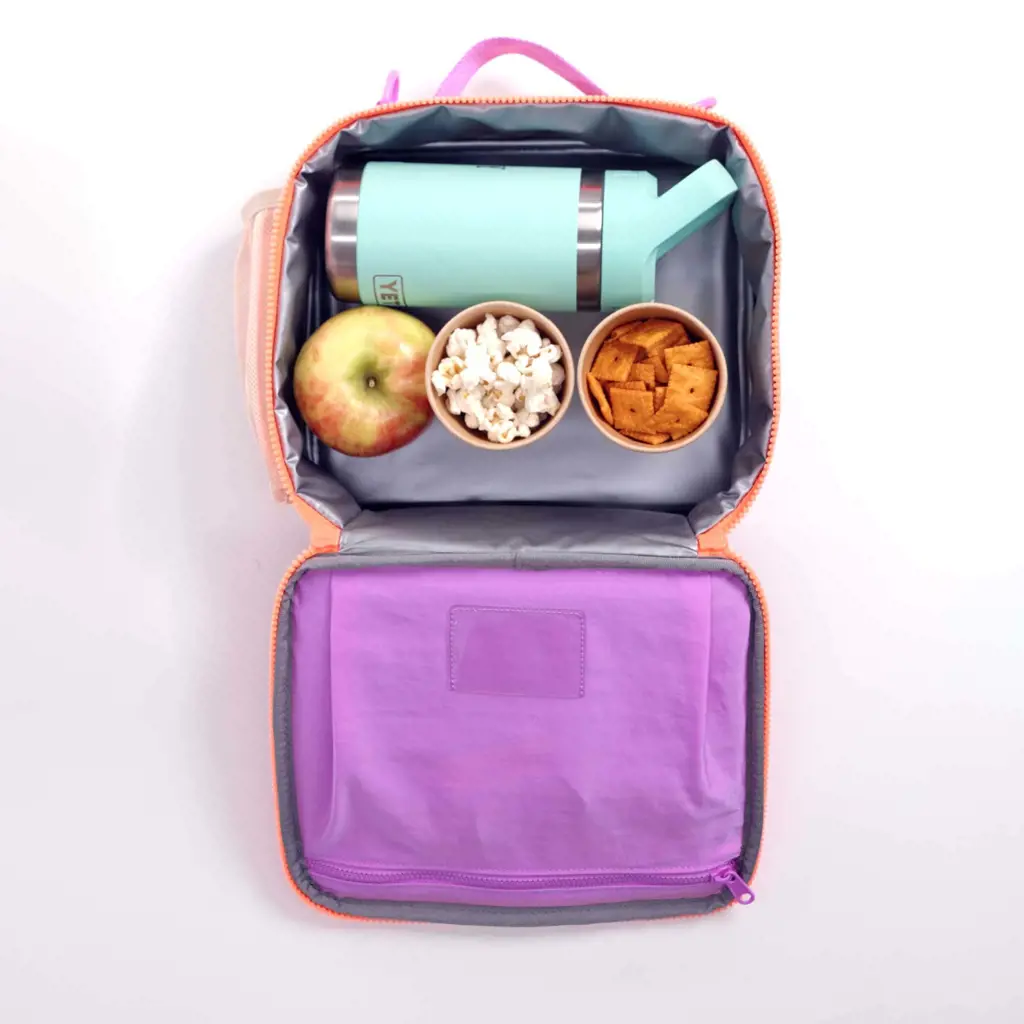
When it comes to packing a laborer's lunch box, simplicity and efficiency are key. Laborers often work long, physically demanding hours, so it's important to pack a lunch that is not only nutritious but also easy to transport and consume on the go. Here are some tips and tricks to help you pack a laborer's lunch box in a way that is efficient and practical:
- Invest in a sturdy lunch box: Choose a lunch box that is durable and can withstand rough handling. Look for one with multiple compartments or dividers to keep different food items separate. A lunch box with a secure lid and a handle or strap will make it easier to carry around on the job site.
- Plan your meals in advance: Before packing a laborer's lunch box, take some time to plan the meals for the week. Consider incorporating a balance of protein, carbohydrates, and vegetables to provide the necessary nutrients for physical exertion. Meal prepping on the weekends can save time and ensure that you have a variety of options to choose from throughout the week.
- Opt for portable, finger-friendly foods: Laborers often don't have the luxury of sitting down for a leisurely meal, so pack foods that are easy to eat on the go. Finger-friendly options like sandwiches, wraps, or burritos are convenient and can be eaten without utensils. Include protein-rich choices like lean meats, cheese, or plant-based alternatives like tofu or beans for sustained energy.
- Use portioned containers or resealable bags: To keep your lunch box organized and avoid leaks or spills, use portioned containers or resealable bags to store individual food items. This way, you can quickly grab a snack or meal without rummaging through your lunch box or having to carry extra utensils.
- Include a variety of snacks: Laborers often need a quick energy boost throughout the day. Pack a mix of healthy snacks like nuts, dried fruits, granola bars, or yogurt to keep hunger at bay. This will help maintain energy levels and prevent the temptation to reach for unhealthy options like vending machine snacks or fast food.
- Pack a refillable water bottle: Staying hydrated is essential for laborers, especially when working in hot or strenuous conditions. Fill a refillable water bottle and pack it in your lunch box to ensure you have access to water throughout the day. Consider adding electrolyte packets to your water or packing a sports drink for added hydration during intense physical activity.
- Don't forget the utensils: Depending on the meal you pack, remember to include the necessary utensils such as a fork, spoon, or knife. Keep a small supply in your lunch box or invest in a compact utensil set that can be easily stored.
In conclusion, packing a laborer's lunch box requires a combination of planning, convenience, and nutrition. By investing in a durable lunch box, planning meals in advance, choosing portable foods, portioning items, including a variety of snacks, and staying hydrated, you can ensure that your lunch is efficient and easy to transport. Remember, a well-packed lunch box can provide the fuel needed for optimal productivity and energy throughout the day.
Essential Items to Pack for a Two-Week Trip to Florida
You may want to see also
Frequently asked questions
Some healthy snacks you can pack in your laborer lunch box are fresh fruits like apples, bananas, or grapes, a handful of nuts or trail mix, carrot sticks with hummus, or yogurt with granola.
To keep your lunch box cool throughout the day, you can include a small ice pack or a frozen water bottle. These can be placed among your food items to help maintain a cool temperature.
Yes, you can pack leftovers in your laborer lunch box. Just make sure to properly store them in an airtight container and refrigerate them overnight. When packing them in the morning, you can reheat them in a microwave-safe container and enjoy a delicious meal at work.







